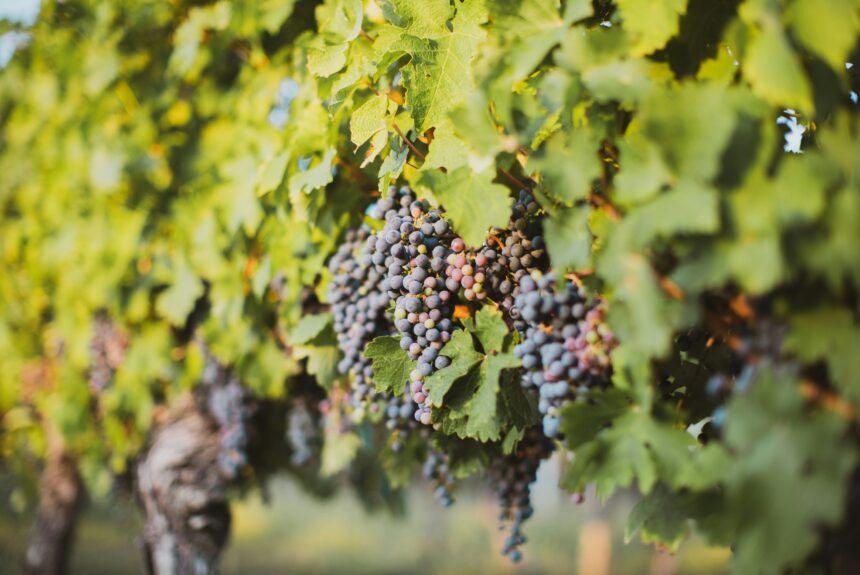The wine industry is undergoing a transformative shift towards circular practices, and the results are not only lucrative but also environmentally conscious. This innovative approach has introduced new revenue streams, fostering more sustainable wines, as well as other food and beverage products. In this evolving landscape, vineyards are no longer confined to traditional winemaking roles; they are becoming key players in a circular economy that prioritizes both economic prosperity and environmental responsibility.
>>>READ: Achieving Greater Food Security in a Changing Climate
Around 12 metric tons of agricultural waste is created every year during the seasonal production of wine globally. In California alone, vineyards generate 100,000 tons of pomace—which is solid residue waste composed of grape seeds and skin—each year. While a standard bottle of wine may be made up of as much as 20% pomace, most waste is either composted or sent to a landfill where it will slowly decompose and emit methane and other greenhouse gases.
Innovative thinking is inspiring the vineyards to rethink pomace and waste, generating a win for the industry and the environment.
In British Columbia, Crush Dynamics is turning wine pomace into a valuable protein ingredient for functional food. The company works with a selection of local wineries in the Okanagan Valley to transform the pomace using a proprietary biomechanical process. This results in a puree that reduces the amount of sugar (by as much as 50%), salt (by as much as 80%), and preservatives used in food and beverages, making them much healthier.
The company’s innovative thinking has attracted nearly $2 million in funding from the Canadian Food Innovation Network. Crush will use this money to advance its two marquee purees: ruby, which is used in sauces, chocolate, and red meat alternatives, and gold, which is ideal for light sauces, sports nutrition, breads, and plant-based dairy items.
In California, two wine experts—Barbara Banke of Jackson Family Wines, and Peggy Furth, the former proprietor of Chalk Hill Winery—have launched research and development firm Sonomaceuticals to create healthy by-products from Chardonnay pomace. The company has partnered with the USDA Agricultural Research Service and the University of California, Davis to create a plant-based natural product ingredient that can be added to packaged foods and offers several health benefits including antioxidants, dietary fiber, and amino acids.
The company’s pomace has been turned into grapeseed oil and milled to produce gluten-free flour. It is also an ideal complement for chocolate, as Sonomaceuticals chairman Scott Forsberg explains, “We discovered that not only does it go well with chocolate, it has something in it that tempers the bitterness of dark chocolate.” The result is a product that makes dark chocolate easier to eat and digest.
The use of grape pomace also has opportunities to grow within the cosmetics industry. Researchers from Lebanon and Italy published a review paper that noted “grape pomaces are considered of interest due to their high content in bioactive molecules, especially phenolic compounds.” It seems that these compounds can help prevent hyperpigmentation by inhibiting melanin production. Other applications for pomace include anti-aging qualities, UV sunscreen protection, and oral care since the compounds could be useful in fighting oral disease.
It is not just pomace that has provided winemakers with new circular profit streams.
In California, the Napa Valley-based, Gamble Family Vineyards is creating wines with the vast quantity of grapes that are dropped from vines during the season. By utilizing a special process called flash détente, which involves a machine that acts a bit like a pressure cooker, the vineyard can make wine from partially ripe fruit. The resultant wine is ideal for selling on the bulk market.
>>>READ: Andes Offers Farmers a Way to Increase Yields, Reduce Emissions
Another California vineyard, Villicana Winery and Vineyard in Paso Robles has identified a different recycling opportunity. After noticing how much waste was created in the winemaking process, vineyard owners Alex and Monica Villicana launched RE:FIND distillery. RE:FIND ferments and distills the free-run juice that many wineries throw away to create gin, rye, and other spirits. RE:FIND’s process allows the company to reclaim approximately 60 acres worth of premium Paso Robles wine grapes annually.
Over in France, vine waste is being used as an eco-friendly race car fuel. TotalEnergies has introduced a 100% renewable fuel called Excellium Racing 100 based purely on wine production waste. According to Total Energies, the wine waste is blended with elements such as Ethyl Tertio Butyl Ether from feedstock to create a high-performance fuel trialed in the FIA World Endurance Championships including the 24 -hour Le Mans race.
Vineyards have long created delicious wines that have been enjoyed by millions. Now the industry is pivoting to develop more sustainable practices and healthier products.
Angela Youngman is a long established freelance journalist and author based in the UK specialising in business, sustainability, travel, tourism, leisure, food & drink.
The views and opinions expressed are those of the author’s and do not necessarily reflect the official policy or position of C3.
